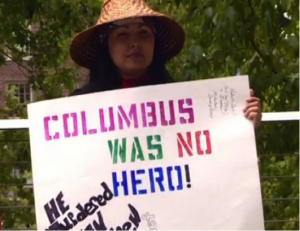On October 6th Seattle lawmakers passed a resolution unanimously to change the name of Columbus Day to Indigenous People’s Day. But why should it be changed? Couldn’t another holiday just be created instead?
In 1492 Columbus sailed the ocean blue. He set forth on the Pinta, the Nino, and the Santa Maria to discover the new world, trade with the natives, and bridge the gap between Europe and the Americas; is what traditional history would like for you to believe.
The truth is that there is a LOT more to the story.
While Columbus did do those things his voyages also brought death, destruction, and genocide upon the Natives living in the Americas. As the Spaniards colonized America, they brought diseases the Natives had never been exposed to, such as smallpox. There are also many accounts of poor treatment and killings of the Native Americans that can qualify as genocide. (Read more about this here).
Native Americans have been, and still are, oppressed by white Americans and settlers in The Americas. It started with many acts of violence against them from the 1492 onward. Wars broke out frequently and many Native Americans were forced into slavery. In 1821 the U.S. government began formally uprooting from their ancestral land what they called the “Five Civilized Tribes”. This process is now recognized as the Trail of Tears.
This oppression carries today because of the treaties and treatment of Native Americans in the past. Many native tribes have been forced onto reservations without many of the other promises being fulfilled. For example the Nisqually Tribe, whose land was in what is today known as Washington State. Their tribe signed the Treaty of Point Elliot in 1855 and it took 2 million acres of their land, but promised in return the ability to fish in their “usual and accustomed grounds and stations.” When the tribe tried to fish in the Nisqually River they were stopped and arrested.
For about a decade this went on until Judge Boldt declared that the Native Tribes could take up to half of the salmon in their traditional waters. This decision affected any tribes included in the Treaty of Point Elliot. Even with this decision, many tribes, such as the Duwamish, are not federally recognized and can’t receive what the treaty and the Boldt decision promised them. The Duwamish have appealed to the federal government many times to get federal recognition and what was promised to them in their treaty, but it has yet to happen.
 The oppression of Native Americans in the past has also led to serious effects today. According to the 2000 census poverty rates in the ten largest reservations average out to about 40% of families affected, as opposed to the 9% national average. This stunningly high rate of poverty is a result of the treatment white Americans have subjugated them to. We can also see oppression in smaller things, such as the name of Washington D.C.’s football team or the normalized cultural appropriation of Native tradition.
The oppression of Native Americans in the past has also led to serious effects today. According to the 2000 census poverty rates in the ten largest reservations average out to about 40% of families affected, as opposed to the 9% national average. This stunningly high rate of poverty is a result of the treatment white Americans have subjugated them to. We can also see oppression in smaller things, such as the name of Washington D.C.’s football team or the normalized cultural appropriation of Native tradition.
I’m extremely lucky to have been able to see and even dance in Kwakwaka’wakw potlatches. I’ve experienced the tradition first hand and I can easily say it’s something worth celebrating. As one supporter of the change said, “we can all celebrate life, instead of genocide.” Seattle has made a great step in the right direction by changing this name. Hopefully sooner, rather than later, more of the U.S. can follow this path.
This blog post was written by Tatum McConnel, sophomore at the Seattle Academy and Communications Coordinator with the 2014 Fall Internship.
